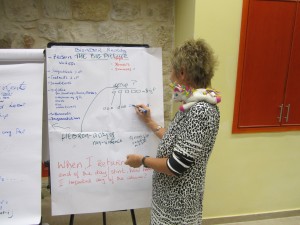Below is the original version of my November column for Mennonite World Review. The edited version is available here.
On October 17, shortly before CPT’s Hebron team sat down to dinner, I checked my Twitter feed. I saw that something was happening in Elsipogtog—a community in Maritime Canada that CPT’s Aboriginal Justice team is accompanying as it resists fracking by SWN Resources on its traditional lands. When I checked the #Elsipogtog hashtag, hundreds of comments began streaming out about arrests, snipers, rubber bullets, teargas, and vehicles on fire. I realized that thousands of miles away in Occupied Palestine I was watching live, via Twitter, an attack by the Canadian police on the Elsipogtog blockade in New Brunswick. And so as we sat down to eat, in the relative quiet of Hebron that evening, we prayed for Elsipogtog—and our tweets about the ongoing attack on the encampment were later retweeted by some of the Palestinian activists who follow the Hebron team’s account.

The blurry red hat is on the head of one of my CPT colleagues. The policeman with the attack dog is very unhappy about her videotaping him.
Because of the chaos caused by the attack, even now, some of its details are unclear, but what basically happened is this: Canadian police, some heavily armed and in military-style camouflage, arrested Chief Arren Sock and dozens of other protesters, while they ransacked the camp and dispersed protestors using teargas and rubber-coated metal bullets. Some of the protestors responded by setting the police cars on fire and throwing things at the police. What had been a nonviolent witness until that moment fell apart.
In the aftermath of the incident, the KAIROS coalition (of which MCC Canada is a member), Amnesty International Canada and the Canadian Friends Service Committee published an open letter to David Alward, the Premier of New Brunswick. In the opening paragraph, the organizations noted, “it is our view that this clash could have been avoided had the province acted in a manner consistent with its obligations to respect the human rights of Indigenous peoples under Canadian and international law.”
The letter then highlights four areas in which the province of New Brunswick could do more to rebuild just relations with Indigenous peoples:
- Acknowledge that Indigenous peoples have rights to their lands, territories, and resources that predate the creation of the Canadian state. International human rights bodies, including the Inter-American Commission on Human Rights have repeatedly condemned Canada’s failure to protect these rights.
- Stop ignoring the land rights of Aboriginal peoples in day-to-day operations of the government. Canadian courts have decreed that governments must consult with Indigenous Peoples before making decisions that affect their rights. “Accordingly,” the letter says, “our organizations urge your government to retract statements indicating that the province is already committed to shale gas development, regardless of opposition.”
- Acknowledge that the province must obtain “free, prior and informed consent” (FPIC) of Indigenous peoples when a proposed project has the potential to affect their cultures, livelihoods, health, and well-being. “Our organizations call on New Brunswick to acknowledge that shale gas exploration and development on or near the traditional lands of Indigenous peoples is clearly an example where the safeguard of free, prior and informed consent is appropriate and necessary.”
- Deploy police with the understanding that they have a clear responsibility to respect and protect human rights, including the lives and safety of those involved in protests. “Use of force must always be a last resort and the scale and nature of the force deployed must be in proportion to the need to protect public safety.”
“Unless the province adopts an approach consistent with these obligations, further clashes may occur,” the letter notes.
Chief Arren Sock released a written statement on October 18, saying “Chief and Council of the Elsipogtog First Nation wish to state clearly that guns and bombs, if any, have no place in our peaceful efforts.” On October 21, Justice George Rideout denied the request by SWN Resources to extend its court injunction to prevent the Elsipogtog protesters from blocking its storage facility. But on November 18, the activists suffered a setback when Judge Judy Clendenning dismissed an application from the Elsipogtog First Nation for an injunction to stop seismic testing for shale gas.The story is still unfolding, streaming, and tweeting.



 Fake Novel Pitches
Fake Novel Pitches 

























































You must be logged in to post a comment.